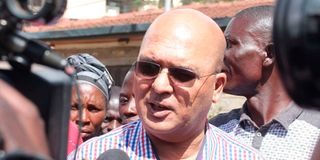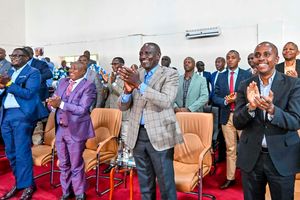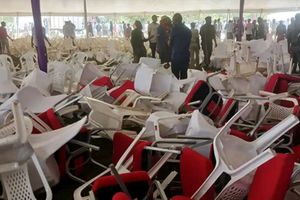
For ordinary Kenyans, being added to a fundraising WhatsApp group without their approval is frustrating, especially when the affected party if distant. In such situations, some may choose to exit the group while others stay without contributing until it is closed after the burial.
However, for politicians, being added to such groups is the norm and, sometimes, an obligation. Their failure to contribute can attract insults, ridicule and sometimes loss of political support from constituents who feel that the leader has abandoned them at their hour of need.
The conversation around politicians and fundraising has come up after a video of Homa Bay Woman Representative, Joyce Atieno Bensouda, surfaced online. While supporting a family that had lost a loved one, she expressed the frustrations MPs feel while standing with their constituents during funerals and other causes.
The lawmaker stated that going forward, she would be committing a flat rate of Sh3,000 to every bereaved family in her county irrespective of the deceased’s stature.
“This is because I'd not want to appear to discriminate against my constituents. If all goes well, I might increase this to Sh3,500 or even Sh5,000, but please be informed that there are times I may fail to support too,” she said
“Hypothetically, if there is a funeral in each of the 40 wards in Homa Bay County and I contribute my Sh3,000 for each, this would total to Sh120,000 in just a day. Now multiply that by 30 days in a month (Sh3,600,000). Do you think I can even manage Sh1.2 million per month for funerals?” She posed.

Homa Bay Woman Representative Dr Joyce Osogo, popularly known as Bensouda.
The gross monthly salary of an MP is Sh725,502 — consisting of basic salary (Sh435,301), house allowance (Sh150,000), commuter allowance and a salary market adjustment of Sh140,201.
Bensouda also noted that MPs support other causes such as church fundraisers, weddings, school fees and more. She claimed that MPs are often ridiculed or insulted for sending 'little' contribution while their support in other areas overlooked.
Generous at funerals

Kisumu East MP Shakeel Shabbir.
But while some legislators are lamenting the impact of fundraisers on their budgets, others like Kisumu East MP Shakeel Shabbir are known to go big on funeral contributions.
Shabbir's support to bereaved families is usually monetary and supplemented by some food stuff — a strategy which has earned him praise and the nickname “Onyango wuon mogo” among his constituents, which loosely translates to "Onyango who owns flour".
The fourth term MP is so passionate about funeral contributions that he has even established a committee to handle them.
Speaking to the Nation, Shabbir said he spends at least five days in his constituency, Thursday to Monday, attending burials.
“I have a budget set aside for all these activities. I fund them from my own pocket. I have a funeral committee headed by my personal assistant that finds out where there are funerals and vets them to ensure that they are within Kisumu East Constituency,” he said.
He revealed that he has formed a fund— Shakeel Ahmed Shabbir Ahmed (Sasa)— where he channels part of his salary. This kitty, he says, is where he gets money he uses to support funeral activities.
He further disclosed that he attends at least 15 funerals on a single weekend in his constituency.
"I sit for a while, address the mourners and hand over my contribution to the family before moving to another burial ceremony," he explained.
After the committee vets bereaved families, he says his office offers at least Sh5,000, a bundle of maize flour, 10 kilogrammes of sugar, cooking oil and an additional Sh3,000 to bereaved families. These items are usually delivered between Thursday and Friday.
“When I attend a funeral, I also donate another Sh3,000 or Sh5,000 to condole with the affected family and sometimes Sh10,000 for the youth. I am a servant of the people who voted for me. More important than the money is my presence since people want to feel you are close to them,” adds Shabbir.
Many believe that this generosity has helped him clinch four terms as MP.
MCAs feel pinch
It's not just MPs who feel pressure to dish out money at funerals, Members of the County Assembly (MCAs) say expectations are high from their constituents.
For instance, Kobura Ward MCA Billy Odhiambo reckons expectations are high because of the perception that they earn high salaries.
“Our constituents believe that we are paid a lot and hence expect huge financial support from us whenever they are bereaved. Usually, I give between Sh2,000 and Sh3,000 but mostly to the less advantaged. On some occasions, I have even been forced to use money meant for my business to fund funerals,” he said.
Where he is unable to send money, the ward representative says, he donates a sack of maize.
The gross salary of an MCA is Sh154,481 per month, which consists of a basic salary (Sh92,689), additional allowances in the form of a house allowance (Sh50,000) and commuter allowance, and a salary market adjustment (Sh11,792).
He believes that as long as MCAs' pay does not change, supporting bereaved families is financially unsustainable for many of his peers.
Economics of death
So how can leaders navigate funeral contributions sustainably? According to George Abwajo, an economist, the current cultural set-up and African up-bringing makes such that people are automatically expected to respond to a neighbour's or community's needs.
Abwajo, who has also contested for a political seat, feels that the economics of death at funerals weighs heavy on politicians in Kenya.
“To cut costs, one may invest in one-line items: for instance, a hearse, a tent and chairs to be used by the community, or actual food to be given to the bereaved family,” he said.
Abwajo believes that by having a community hearse on standby, elected leaders can help cushion bereaved families from funeral costs by between Sh15,000 and Sh40,000.
“This kind of contribution is bigger and better than dishing Sh3,000 at every funeral.”
A less popular solution, he suggests, is encouraging constituents to take up a form of death insurance. In popularly Western Kenya, a similar package referred to as "last expense" has become popular in the region.
It's a funeral expense package for individuals or groups designed to protect one's financial security, as well as that of loved ones, in the event of their demise. Individuals contribute a modest amount every month in exchange for benefits such as providing hearse services, tents, transportation and more.






